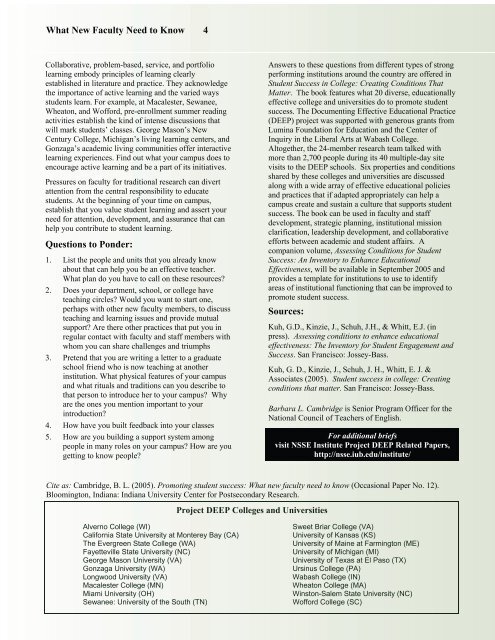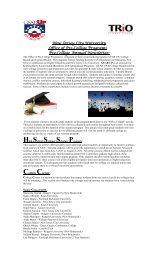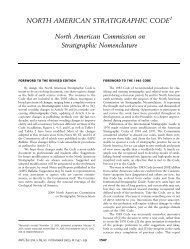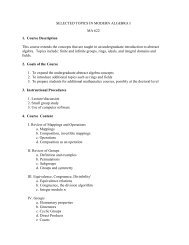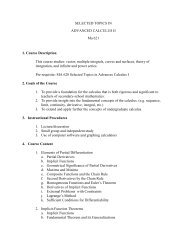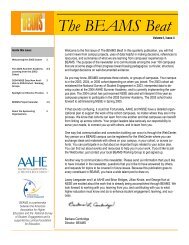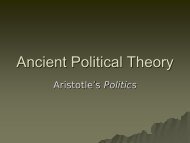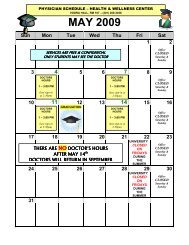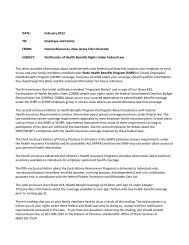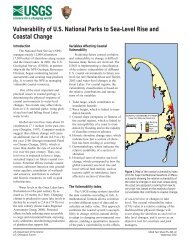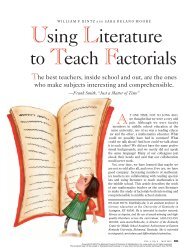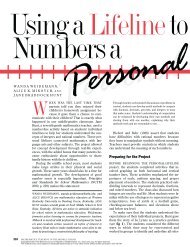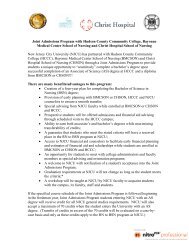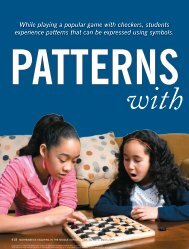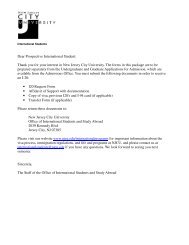DEEP Practice Brief What New Faculty Need to Know - NSSE
DEEP Practice Brief What New Faculty Need to Know - NSSE
DEEP Practice Brief What New Faculty Need to Know - NSSE
You also want an ePaper? Increase the reach of your titles
YUMPU automatically turns print PDFs into web optimized ePapers that Google loves.
<strong>What</strong> <strong>New</strong> <strong>Faculty</strong> <strong>Need</strong> <strong>to</strong> <strong>Know</strong> 4<br />
Collaborative, problem-based, service, and portfolio<br />
learning embody principles of learning clearly<br />
established in literature and practice. They acknowledge<br />
the importance of active learning and the varied ways<br />
students learn. For example, at Macalester, Sewanee,<br />
Whea<strong>to</strong>n, and Wofford, pre-enrollment summer reading<br />
activities establish the kind of intense discussions that<br />
will mark students’ classes. George Mason’s <strong>New</strong><br />
Century College, Michigan’s living learning centers, and<br />
Gonzaga’s academic living communities offer interactive<br />
learning experiences. Find out what your campus does <strong>to</strong><br />
encourage active learning and be a part of its initiatives.<br />
Pressures on faculty for traditional research can divert<br />
attention from the central responsibility <strong>to</strong> educate<br />
students. At the beginning of your time on campus,<br />
establish that you value student learning and assert your<br />
need for attention, development, and assurance that can<br />
help you contribute <strong>to</strong> student learning.<br />
Questions <strong>to</strong> Ponder:<br />
1. List the people and units that you already know<br />
about that can help you be an effective teacher.<br />
<strong>What</strong> plan do you have <strong>to</strong> call on these resources?<br />
2. Does your department, school, or college have<br />
teaching circles? Would you want <strong>to</strong> start one,<br />
perhaps with other new faculty members, <strong>to</strong> discuss<br />
teaching and learning issues and provide mutual<br />
support? Are there other practices that put you in<br />
regular contact with faculty and staff members with<br />
whom you can share challenges and triumphs<br />
3. Pretend that you are writing a letter <strong>to</strong> a graduate<br />
school friend who is now teaching at another<br />
institution. <strong>What</strong> physical features of your campus<br />
and what rituals and traditions can you describe <strong>to</strong><br />
that person <strong>to</strong> introduce her <strong>to</strong> your campus? Why<br />
are the ones you mention important <strong>to</strong> your<br />
introduction?<br />
4. How have you built feedback in<strong>to</strong> your classes<br />
5. How are you building a support system among<br />
people in many roles on your campus? How are you<br />
getting <strong>to</strong> know people?<br />
Answers <strong>to</strong> these questions from different types of strong<br />
performing institutions around the country are offered in<br />
Student Success in College: Creating Conditions That<br />
Matter. The book features what 20 diverse, educationally<br />
effective college and universities do <strong>to</strong> promote student<br />
success. The Documenting Effective Educational <strong>Practice</strong><br />
(<strong>DEEP</strong>) project was supported with generous grants from<br />
Lumina Foundation for Education and the Center of<br />
Inquiry in the Liberal Arts at Wabash College.<br />
Al<strong>to</strong>gether, the 24-member research team talked with<br />
more than 2,700 people during its 40 multiple-day site<br />
visits <strong>to</strong> the <strong>DEEP</strong> schools. Six properties and conditions<br />
shared by these colleges and universities are discussed<br />
along with a wide array of effective educational policies<br />
and practices that if adapted appropriately can help a<br />
campus create and sustain a culture that supports student<br />
success. The book can be used in faculty and staff<br />
development, strategic planning, institutional mission<br />
clarification, leadership development, and collaborative<br />
efforts between academic and student affairs. A<br />
companion volume, Assessing Conditions for Student<br />
Success: An Inven<strong>to</strong>ry <strong>to</strong> Enhance Educational<br />
Effectiveness, will be available in September 2005 and<br />
provides a template for institutions <strong>to</strong> use <strong>to</strong> identify<br />
areas of institutional functioning that can be improved <strong>to</strong><br />
promote student success.<br />
Sources:<br />
Kuh, G.D., Kinzie, J., Schuh, J.H., & Whitt, E.J. (in<br />
press). Assessing conditions <strong>to</strong> enhance educational<br />
effectiveness: The Inven<strong>to</strong>ry for Student Engagement and<br />
Success. San Francisco: Jossey-Bass.<br />
Kuh, G. D., Kinzie, J., Schuh, J. H., Whitt, E. J. &<br />
Associates (2005). Student success in college: Creating<br />
conditions that matter. San Francisco: Jossey-Bass.<br />
Barbara L. Cambridge is Senior Program Officer for the<br />
National Council of Teachers of English.<br />
For additional briefs<br />
visit <strong>NSSE</strong> Institute Project <strong>DEEP</strong> Related Papers,<br />
http://nsse.iub.edu/institute/<br />
Cite as: Cambridge, B. L. (2005). Promoting student success: <strong>What</strong> new faculty need <strong>to</strong> know (Occasional Paper No. 12).<br />
Blooming<strong>to</strong>n, Indiana: Indiana University Center for Postsecondary Research.<br />
Project <strong>DEEP</strong> Colleges and Universities<br />
Alverno College (WI)<br />
California State University at Monterey Bay (CA)<br />
The Evergreen State College (WA)<br />
Fayetteville State University (NC)<br />
George Mason University (VA)<br />
Gonzaga University (WA)<br />
Longwood University (VA)<br />
Macalester College (MN)<br />
Miami University (OH)<br />
Sewanee: University of the South (TN)<br />
Sweet Briar College (VA)<br />
University of Kansas (KS)<br />
University of Maine at Farming<strong>to</strong>n (ME)<br />
University of Michigan (MI)<br />
University of Texas at El Paso (TX)<br />
Ursinus College (PA)<br />
Wabash College (IN)<br />
Whea<strong>to</strong>n College (MA)<br />
Wins<strong>to</strong>n-Salem State University (NC)<br />
Wofford College (SC)


